Those wondering whether dogs can eat kidney beans will be happy to know that when cooked, kidney beans are packed with protein, vitamins, and minerals that make a fine addition to a healthy diet. However, raw kidney beans, as well as other certain legumes, are highly hazardous to dogs and shouldn’t be given to them.
Read on to learn more about kidney beans, their potential benefits and risks, and everything you need to know before considering adding them to your pup’s diet.

Raw kidney beans, as well as other certain legumes, are highly hazardous to dogs and shouldn’t be given to them.
©AndrasKiss/Shutterstock.com
Can Dogs Eat Kidney Beans?
Simply put, yes, your dog can and should enjoy small portions of prepared kidney beans. Cooked beans are an excellent source of plant-based proteins and fiber, which is why several commercial dog food makers add legumes to their formulations. Kidney beans also contain plenty of vitamin K, minerals, folic acid, and antioxidants that help keep your pup healthy, active, and full of age-appropriate energy.
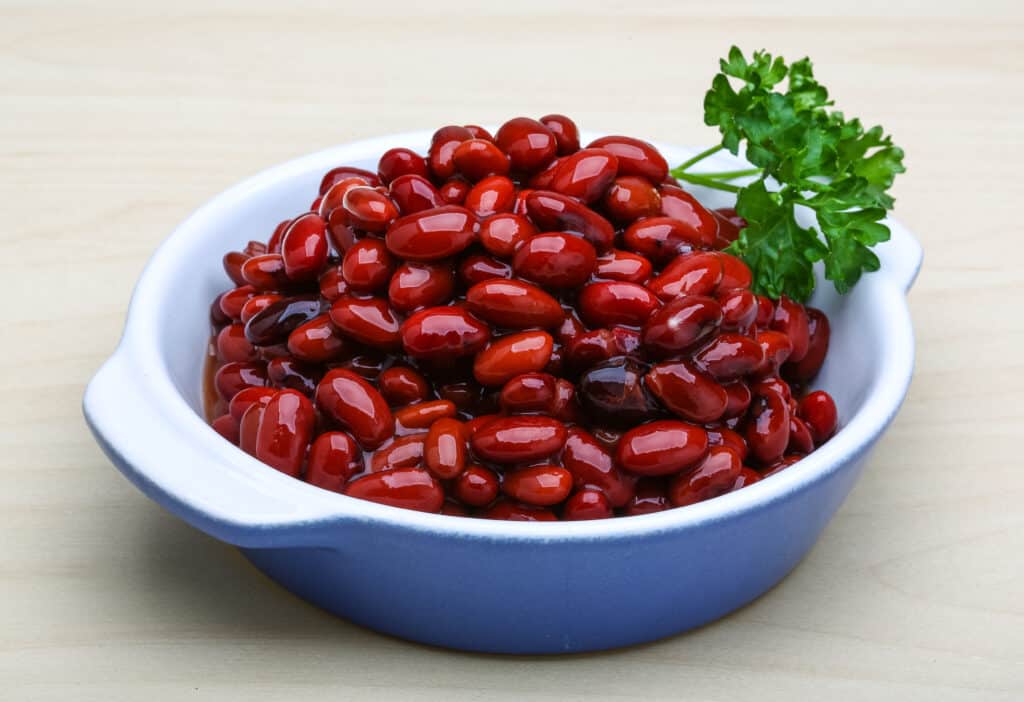
Cooked kidney beans are an excellent source of plant-based proteins and fiber.
©Andrey Starostin/Shutterstock.com
As with all human food, it’s essential to correctly portion serving sizes of kidney beans and keep them at less than 10% of your dog’s overall caloric intake.
Can Dogs Eat Raw Kidney Beans?
Raw kidney beans are highly toxic to dogs. Uncooked beans contain lectin phytohemagglutinin (PHA), a protein that binds to carbohydrates and can cause red blood cells to stick together. This can lead to clogged arteries and cause various health issues, such as elevated heart disease risk and risk of a heart attack.
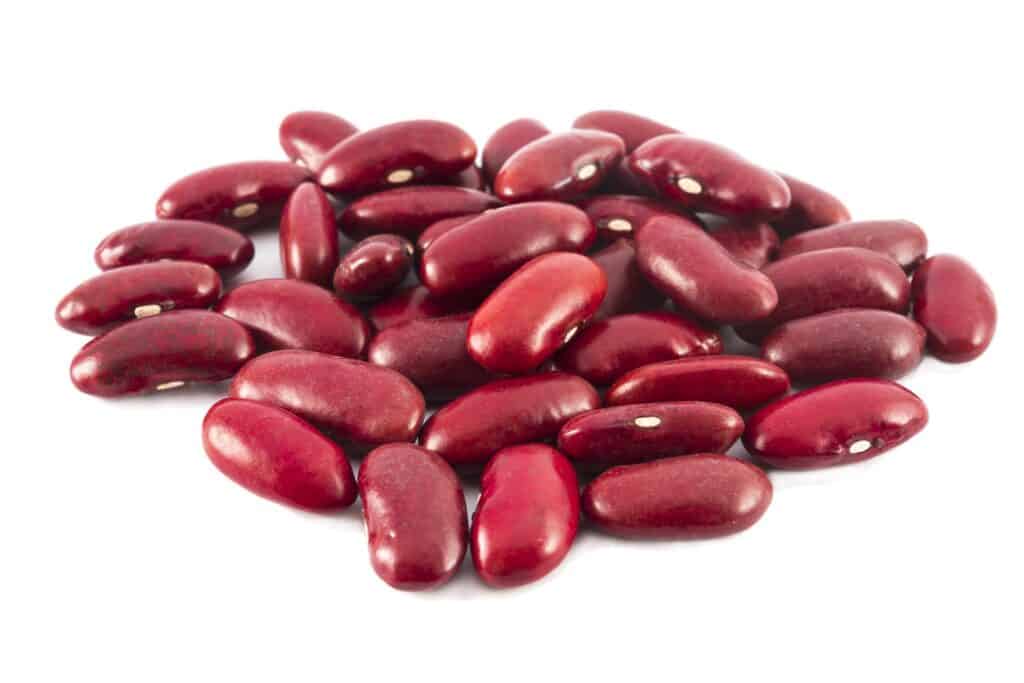
Raw kidney beans are highly toxic to dogs.
©Satit Pecharut/Shutterstock.com
To prevent this, soak your beans overnight and cook them over high heat to break down the lectins and make them safe for your dog to eat.
Can Dogs Eat Canned Kidney Beans
While canned beans are technically safe for your dogs to eat, as they’ve been pre-cooked, it’s important to provide them in moderation. Canned kidney beans often contain sodium and preservatives, which can adversely affect dogs in high concentrations.
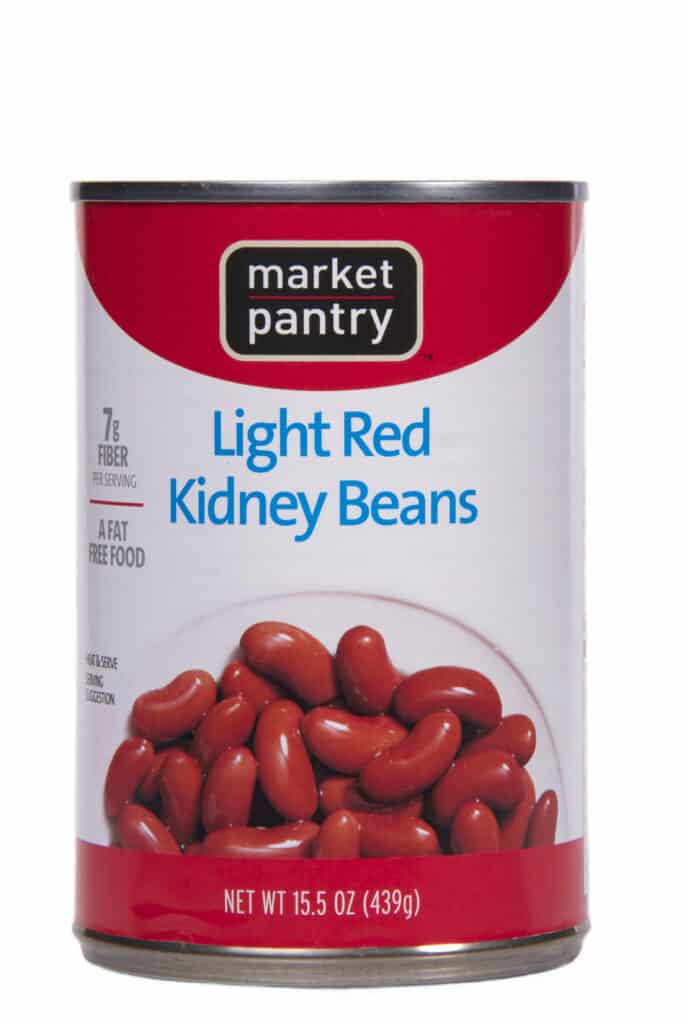
Canned kidney beans often contain sodium and preservatives, which can adversely affect dogs in high concentrations.
©Sheila Fitzgerald/Shutterstock.com
Health Benefits of Kidney Beans for Dogs
Kidney beans feature several antioxidant properties that combat free radicals in your puppy’s body, boosting their immune function and keeping them healthy. For example, folic acid helps regulate blood sugar and boost the healthy production of red blood cells. Vitamin K and other minerals can even prevent the development of cancer in your dog.
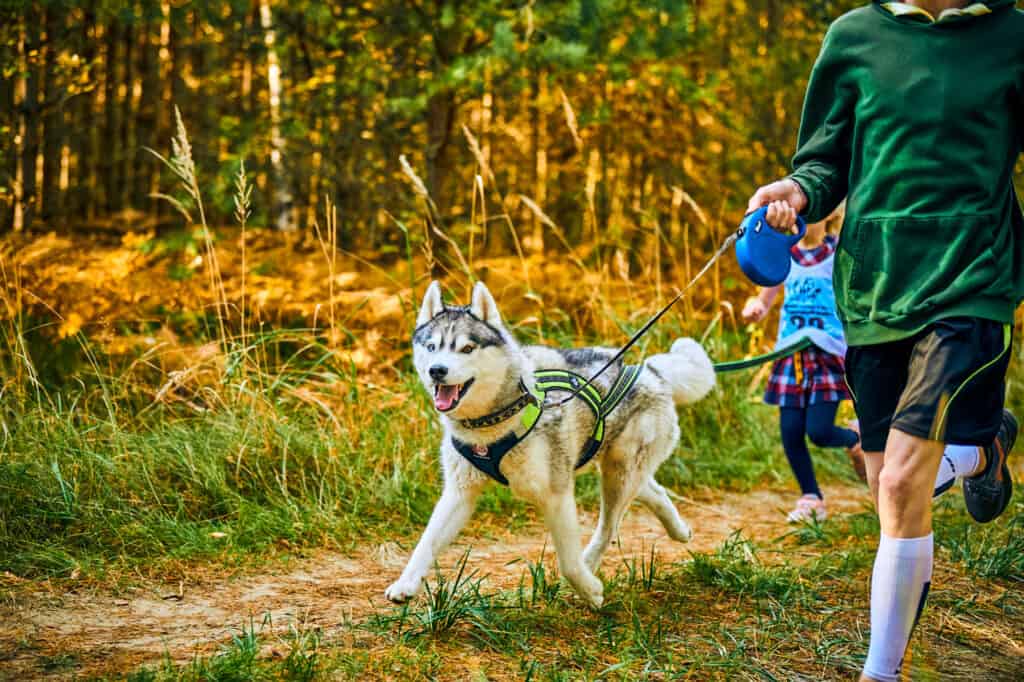
Protein is essential for metabolic function, muscle development and maintenance, and keeping your dog’s energy levels healthy.
©iStock.com/TRAVELARIUM
Beans of all types, including kidney beans, contain high levels of protein that can help supplement a lack of amino acids in your dog’s diet. Protein is essential for metabolic function, muscle development and maintenance, and keeping your dog’s energy levels healthy.
Kidney beans are a slow-release carbohydrate food, which helps maintain healthy blood sugar levels and keep your canine’s energy healthy. Kidney beans also help your dog feel fuller longer, which can help keep hunger at bay in dogs struggling with weight management issues.
Health Risks of Kidney Beans for Dogs
Kidney beans contain high levels of fiber. Moderate amounts can improve your dog’s digestive function, but too much can make your dog gassy or cause constipation. Keep an eye out for bloating, discomfort, or lack of appetite, as these can be signs of bean-related issues. Consult your vet if regular bowel movement doesn’t resume after a few days.
Canned kidney beans can contain high levels of preservatives, salt, and other seasonings that can upset your pet’s stomach. Giving them plain cooked kidney beans will ensure your pup doesn’t experience painful stomach issues.

Canned kidney beans can contain high levels of preservatives, salt, and other seasonings that can upset your pet’s stomach.
©HandmadePictures/Shutterstock.com
Due to their high levels of lectin protein, uncooked beans can be toxic to dogs. Too much lectin can clump your pup’s red blood cells and increase its risk of heart attack or heart disease.
How to Feed Your Dog Kidney Beans
It’s best to introduce kidney beans to your dog slowly, to build up their tolerance for the dish. Your veterinarian can provide you with appropriate serving sizes, but generally speaking, it’s best to scale down portions for smaller dogs or those with dietary sensitivities. Beans should make up no more than 10% of your dog’s total daily diet.
Once you’ve introduced your dog to kidney beans, monitor their behavior for signs of adverse reactions. Common symptoms include swelling, stomach upset, or itchiness. Keep your kidney beans free of seasonings or preservatives, opting for home-cooked plain kidney beans instead of raw or canned varieties.
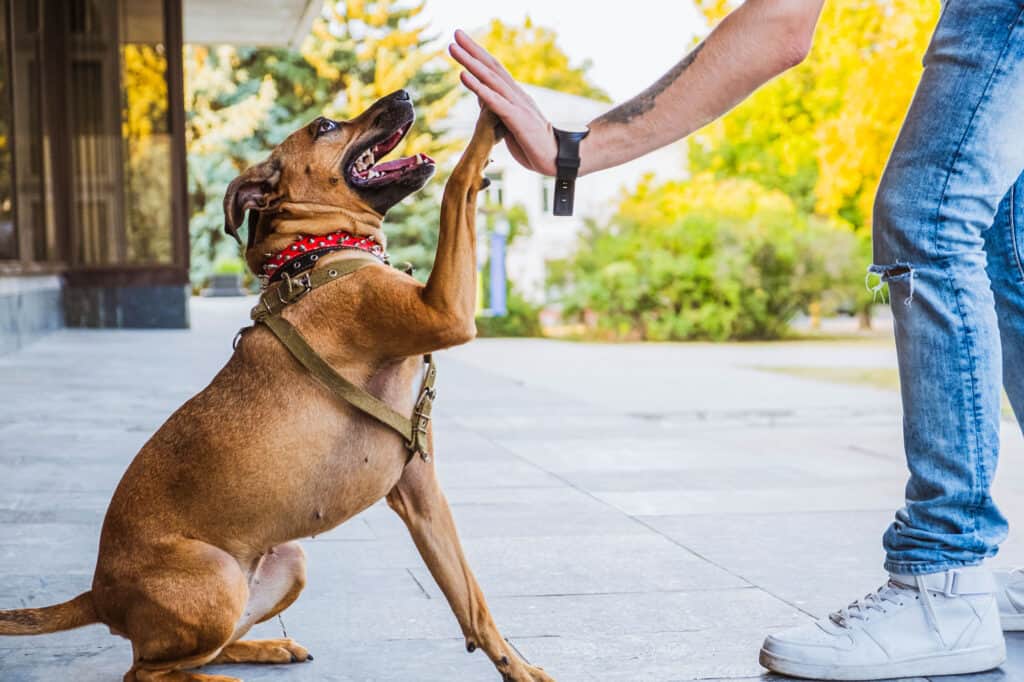
Your dogs might not thank you for feeding them kidney beans, but they are, in moderation, an excellent addition to their diet.
©iStock.com/Photoboyko
Kidney beans feature many health benefits for your dog and, when given in moderation, are an excellent addition to their diet. However, it’s advisable to provide smaller servings and continually monitor your pet, as humans process foods much differently than our dogs. When in doubt, talk with your veterinarian to see if kidney beans are a good addition to your pup’s daily diet
Up Next
The photo featured at the top of this post is © Satit Pecharut/Shutterstock.com
Sources
- ncbi.nlm.nih.gov, Available here: https://www.ncbi.nlm.nih.gov/pmc/articles/PMC6827403/
- a-z-animals.com, Available here: https://a-z-animals.com/reviews/the-best-limited-ingredient-dog-food-good-for-allergies/
- a-z-anmals.com, Available here: https://a-z-animals.com/animals/human/
- pubmed.ncbi.nlm.nih.gov, Available here: https://pubmed.ncbi.nlm.nih.gov/4050341/
Thank you for reading! Have some feedback for us? Contact the AZ Animals editorial team.






